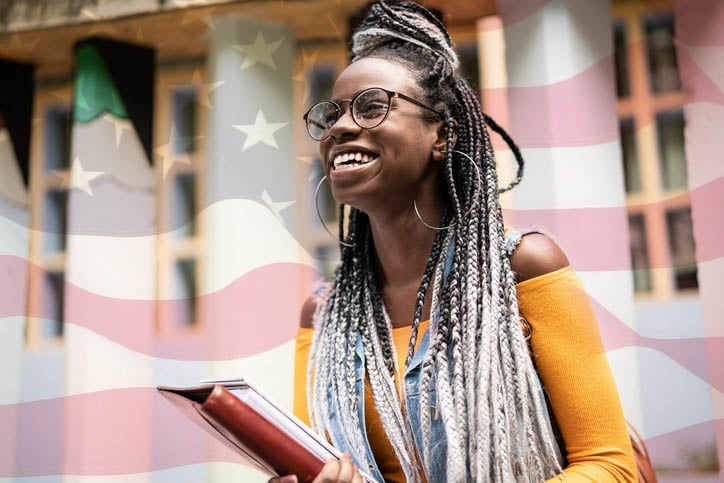
There are long lists of tertiary institutions online for students who want to further their studies. We've got one of our own complete with contact details and everything you need to get into your dream tertiary institution in South Africa.
Also read: South Africa's universities and colleges: contact details
But when you start applying to institutions you’ll feel this intense urge to take those inspirational words at your school assembly to heart: “The world is your oyster,” you’ll hear, it echoing in your head. And before long you’ll find yourself googling the admission requirements for Harvard.
Of course, hundreds of thousands of students apply to prestigious institutions in the United States such as Yale, Princeton and Harvard. In fact, this year Harvard received a record 42 723 applications, of which the institution will typically accept less than 5%. But that shouldn’t deter your inner Elle Woods.
Here's the inside scoop on how you too can become America’s sweetheart. In the hope of giving you the best possible chance of getting into a university in the USA, we’ve put together our comprehensive guide to studying in the States.
What universities in the States are looking for
When compiling your application form, keep in mind that your academics is not all that matters to international institutions. Duncan Parsons, a country manager of Crimson Education – an organisation that mentors learners, matches them with institutions, and helps them to increase their chances of getting into America's world-class universities – explains that about 30% of an application to an American university is typically based on activities outside of academic curricula.
He makes specific mention of the following aspects that make for a “well-rounded” candidate:
- Extra-curricular activities during high school
- An engaging personal story
- Someone who stands out from the crowd
- Someone who has a variety of interests
- Someone demonstrating entrepreneurial drive
“Colleges look for and fund students who demonstrate that they’ll use the university’s resources to the fullest – they want to see initiative and the potential to become a leader in your field,” explains Duncan, who sold watches online during his school years before getting a full-ride Robertson Scholarship to Duke University.
Step 1: Choosing an institution
If you aren’t enlisting the help of an organisation to guide you through the process, it could be a confusing journey. But once you’ve narrowed down the State in which you’d like to study, finding an institution becomes somewhat easier. And International Student has a nifty tool that helps you search by State – perfect!
But you can also use the tool by entering your field of study, degree level, tuition range and even religious affiliation. That way, if you know you want to go to America but aren’t sure exactly which State, the tool will adapts itself to your interests and needs.
From there you can look at specific state guides here: Universities in the States.
Or study guides by subject which even outlines what the degree may potentially include: Study guide by subject.
Also read: Your ultimate university guide
Step 2: The application process
Of course, the application process itself, as well as the requirements, will be different for every institution and degree. But oftentimes students underestimate just how much work goes into applying. Not only will you have to fill out an application form and send it in well before you think you’ll hopefully start your studies, but many institutions also ask for additional documents. For most undergraduate programmes these may include:
- Educational credentials in the form of transcripts
- Recommendation letters from teachers, tutors, coaches and mentors
- An essay or personal statement from you, motivating why you should be given the opportunity to study in the States
- Your standardised test scores
Just as you would have to write National Benchmark Tests when applying to any local university, you’d also having to write standardised tests for study in the US to assess your English proficiency level and academic ability.
For undergraduate admissions, required standardised tests usually include:
- Scholastic Assessment Test (SAT)
- Test of English as a Foreign Language (TOEFL)
- American College Testing (ACT)
For graduate and professional admissions, required tests usually include:
- Test of English as a Foreign Language (TOEFL)
- Graduate Record Examinations (GRE) – for liberal arts, science, math
- Graduate Management Admission Test (GMAT) – for business schools/study for MBA (Master’s in Business Administration) programmes
- Law School Admission Testing Program (LSAT) – for law schools
- Medical College Admission Test (MCAT) – for medical schools
- Dental Admission Testing Program (DAT) – for dental schools
- Pharmacy College Admission Test (PCAT)
- Optometry Admission Testing Program (OAT)
Step 3: Getting your student visa
After you’re accepted to the university of your choice, the process is not quite over yet. You’ll have to start preparing for your stay, which will include sorting out a healthcare plan, a place to stay, as well as how you’re going to make your way from South Africa to the US.
Applying for a student visa from the Consular Sections of the US Consulates General in Johannesburg, Durban and Cape Town isthe next step you’ll have to take to complete your journey.
Click here to read more and apply: Official nonimmigrant (temporary) visa information and appointment website for the US Embassy in South Africa
There are three different student visas one can apply for:
F1 Visas
These are issued to students who are attending an academic program or English Language Program. F-1 status allows for part-time, on-campus employment (fewer than 20 hours per week). Additionally, students can work on optional practical training (OPT) for up to one year after completion of their academic programme. Students are expected to complete their studies by the expiration date on the I-20 form (Certificate of Eligibility for Nonimmigrant Student Status).
J1 Visas
J1 Visas are issued to students who need to obtain practical training that is not available in their home country to complete their academic program. J-1 student status allows for similar employment as the F-1 visa, with similar restrictions, as long as permission is given by the exchange visitor programme sponsor.
M1 Visas
M1 Visas are issued to students who are going to attend a non-academic or vocational school. M-1 visa holders for technical and vocational programmes are not permitted to work during the course of their studies. The M-1 student visa applicants must have evidence that sufficient funds are immediately available to pay all tuition and living costs for the entire period of intended stay.
Application requirements
The online application form is a requirement and must be completed and submitted before one can make an appointment with the consulate. At your appointment, for which the wait time currently stands at 16 calendar days, you will need the following documents along with your DS-160 form:
- Your SEVIS ID, which should be printed on your I-20 or DS-2019
- Appointment confirmation page
- Passport
- Travel itinerary, if you have already made travel arrangements
- The address of the school/programme at which you intend to study
- One colour photo that meets the US visa photo requirements
- Dates of your last five visits or trips to the United States, if you have previously travelled to the United States. You may also be asked for your international travel history for the past five years. So you’d also need to take along all passports that show previously issued visas to the United States or international trips.
Additional documents may include:
- Any supporting documents, such as bank statements, or your university acceptance letter
- Your CV, as you may be required to provide information about your current and previous education and/or work history
Before even showing up for your interview, you will also have to pay the visa application processing fee which is non-refundable and non-transferable. As it stands the US Visa (MRV) Fees is $160 (approximately R2 300).
In addition, students will also have to pay a separate SEVIS (Student and Exchange Visitor Information System) fee, as well as an additional fee for visa issuance, known as a reciprocity fee.
Step 4: Funding your studies
If the visa application fee, the seperate SEVIS fee, and then the additional reciprocity fee, indicate anything, it’s that this adventure may very well cost an arm and a leg.
Of course, tuition fees will differ from university to university, but once you factor in this, along with your travel costs and living expenses, you may feel reluctant to go. Don’t let that scare you though. There are lots of scholarships available to South Africans who have their sights set of the US.
We’ve listed a few below to get you started:
- The AU Emerging Global Leader Scholarship
- The Fulbright Scholar Program
- The Hubert H. Humphrey Fellowship Program
- The FirstRand Laurie Dippenaar scholarship
More scholarships for international study:
- Commonwealth Scholarships
- The British Chevening Scholarships for International Students
- Rhodes Scholarships
- Macquarie Vice-Chancellor’s International Scholarships
- Australia Awards Scholarships
- Vanier Canada Graduate Scholarships
For a full list of bursaries in South Africa, click here.
And for more on scholarships, loans and how to fund your studies at SA’s tertiary institutions, click here.
Chat back:
Did you or your child study in the States? Tell us about your experience and we could share your story with other families.




 Publications
Publications
 Partners
Partners















